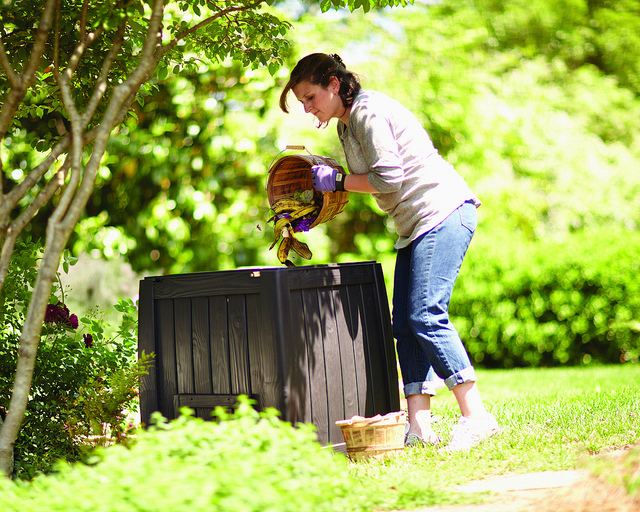The holiday season is arguably the most scrumptious time of year. However, these holiday feasts can generate a cringe-worthy amount of waste. According to the Worldwatch Institute, U.S. Americans generate three times as much food waste during the time between Thanksgiving and New Year’s than they do during the rest of the year.
In addition to encouraging self-serve, saving leftovers, and avoiding preparing an excessive amount of food, composting is a relatively simple and low-cost way to minimize waste and help out the environment during the holidays.
Why Compost?
The Environmental Protection Agency (EPA) reports that food scraps and yard waste make up 20-30 percent of landfill contents in the U.S. In landfills, this organic waste decomposes without oxygen, producing methane, which is 21 to 25 times more potent than carbon dioxide as a greenhouse gas. When we compost organic waste, carbon dioxide is produced instead of methane. What’s more, composted materials eventually become humus, an all-natural, nutrient-packed substance that can be used as an excellent alternative to synthetic fertilizers. So, composting is excellent way to do your part in helping fight climate change and pollution.
How to Compost
Compost piles require three ingredients:
- Brown Component: Dead leaves, branches, twigs, stems, etc. These contribute carbon to your compost pile.
- Green Component: Grass clippings, fruit and vegetable waste, food scraps, coffee grounds, etc. These materials release nitrogen when they break down.
- Water: Moisture is necessary for decomposition.
A compost pile with equal parts brown to green components will maintain the ideal pH for productive decomposition. Be sure to shred or chop larger compost inputs, and regularly turn your compost over with a shovel to keep the green and brown elements mixed. Humus, the portion you can use to fertilize your garden, will appear as dark brown or black soil at the bottom of your pile.
If you’re new to composting, find a dry, shaded area in your yard. Proximity to a water source is helpful (you may have to water the pile occasionally–it should always have some moisture). No yard? No problem! Affordable indoor composting bins can do the trick. A properly managed compost pile shouldn’t smell or attract pests. If you can’t compost at home, research whether your city offers curbside composting.
What to Compost
As a rule, compostable items are typically plant-based and haven’t been treated with chemicals that could harm plants. Here’s are some general Dos and Don’ts for composting:
If you’re wondering whether something else is compostable, check out Compost This, a website with a nearly comprehensive list of what you can and cannot compost. Begin with the Bin created a Thanksgiving-specific composting infographic that tells you exactly what to do with all of your turkey day waste.
This holiday season, consider composting your food scraps for a more sustainable celebration. Happy composting, and Happy Holidays!
Sharon Schweitzer and Emilie Lostracco co-wrote this post. Sharon Schweitzer, J.D., is a cross-cultural trainer, modern manners expert, and the founder of Access to Culture. In addition to her accreditation in intercultural management from the HOFSTEDE centre, she serves as a Chinese Ceremonial Dining Etiquette Specialist in the documentary seriesConfucius was a Foodie, on Nat Geo People. She is the resident etiquette expert on two popular lifestyle shows: ABC Tampa Bay’s Morning Blend and CBS Austin’s We Are Austin. She is regularly quoted by BBC Capital, Investor’s Business Daily, Fortune, and the National Business Journals. Her Amazon #1 Best Selling book in International Business, Access to Asia: Your Multicultural Business Guide, now in its third printing, was named to Kirkus Reviews’ Best Books of 2015. She’s a winner of the British Airways International Trade Award at the 2016 Greater Austin Business Awards.
Emilie Lostracco is a Fall 2017 Cross-Cultural Communication Intern with Access to Culture. The Montreal native is currently a senior at the University of Texas at Austin, studying International Relations and Global Studies. Emilie specializes in international environmental efforts, European studies, and French. She plans on graduating with honors in December. Connect with her via Linkedin.
Photo credit: SITS Girls on Flickr



Leave A Comment